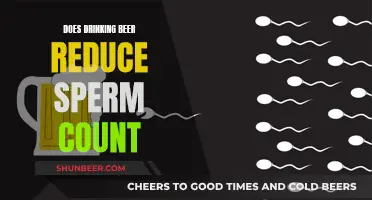
Whether you need to worry about alcohol intake affecting testosterone mostly depends on how much you drink and how often. Occasional and light to moderate drinking may actually cause an increase in testosterone production. However, drinking alcohol in excess will harm your natural testosterone production.
Heavy drinking is usually considered more than 15 drinks a week for men or more than eight drinks a week for women. Men who drink heavily are more likely to experience erectile dysfunction and low testosterone levels.
Research has found that testosterone can drop in as little as 30 minutes after alcohol consumption. In one study, healthy men were given a pint of whiskey per day for 30 days, and their testosterone levels were compared to those of men with chronic alcoholism. The healthy men’s testosterone levels began dropping by the third day and reached similar levels to those of the men with alcoholism by the end of the month.
| Characteristics | Values |
|---|---|
| Occasional and light to moderate drinking | May increase testosterone production |
| Heavy drinking | May decrease testosterone production |
| Alcohol consumption and sperm count | Research is unclear |
| Alcohol consumption and testosterone deficiency | Risk is higher in heavy drinkers who experience facial flushing |
What You'll Learn

Short-term effects of alcohol on testosterone
Alcohol can have a range of short-term effects on testosterone levels in both men and women. Testosterone is a primary sex hormone in males, responsible for sex drive, hair growth, and healthy bone and muscle development. While the impact of alcohol is felt more acutely in men, women can also suffer from decreased testosterone due to alcohol use.
Research has found that testosterone levels can drop as quickly as 30 minutes after drinking alcohol. One study found that healthy men who were given a pint of whiskey per day for 30 days experienced a drop in testosterone levels by the third day. By the end of the month, their testosterone levels were similar to those of men with chronic alcoholism.
Alcohol can disrupt testosterone production by interfering with the three glands responsible for its production: the hypothalamus, anterior pituitary gland, and testes. Acute alcohol consumption can cause short-term impairments in testosterone release by negatively affecting the hypothalamus and pituitary gland.
In addition, alcohol can lead to elevated levels of estrogen, the female sex hormone, as well as the stress hormone cortisol, which can destroy testosterone. Alcohol can also disrupt the sleep cycle, further decreasing the body's ability to produce testosterone.
While light to moderate alcohol consumption is unlikely to cause significant damage to testosterone levels, heavy drinking can lead to a decrease in testosterone production and negative health consequences.
Beer and Lifting Weights: A Healthy Balance?
You may want to see also

Long-term effects of alcohol on testosterone
Alcohol negatively affects almost every aspect of health, including hormone health. Excessive drinking can cause both short-term and long-term changes to many hormones in the body, including testosterone. Testosterone is the primary male sex hormone, giving men their masculine features and playing a critical role in muscle and bone growth, as well as sperm development.
Heavy drinkers are more likely to experience poor testicular function than moderate drinkers. Heavy drinking is usually defined as more than 15 drinks a week for men or more than eight drinks a week for women. Men who drink heavily are more likely to experience erectile dysfunction and low testosterone levels.
Chronic alcohol misuse is believed to damage the Leydig cells in the testes, which are responsible for testosterone production. Alcohol may also interfere with the release of luteinizing hormone (LH), follicle-stimulating hormone (FSH), and gonadotropin-releasing hormone (GnRH).
Moderate alcohol consumption, defined as no more than one drink per day for women or two drinks per day for men, does not seem to have long-term effects on reproductive health or testosterone levels.
Tech Football and Beer: What's Allowed?
You may want to see also

Alcohol and female testosterone
Alcohol can have a significant impact on female testosterone levels, although the extent and nature of this impact may vary depending on various factors such as age, menstrual cycle phase, and alcohol consumption patterns. Here are some key insights on the relationship between alcohol and female testosterone:
The Impact of Alcohol on Female Testosterone Levels:
- Excessive alcohol consumption can cause short-term and long-term changes in hormone levels, including testosterone.
- While testosterone is typically associated with male characteristics, women also produce a small amount of testosterone in their ovaries.
- Alcohol interferes with the production of testosterone by disrupting the hypothalamus, pituitary gland, and ovaries (equivalent to testes in males).
- Heavy drinking is generally defined as more than eight drinks per week for women and can lead to poor ovarian function.
- Chronic alcohol misuse can damage the ovaries, leading to reduced testosterone production and potentially causing low sex drive and brittle bones.
- However, moderate alcohol consumption (no more than one drink per day for women) does not appear to have significant long-term effects on reproductive health or testosterone levels.
Age-Related Differences:
- The relationship between alcohol and testosterone may vary depending on age. For example, adolescent females may be more susceptible to the effects of alcohol on their hormonal balance.
- In contrast, older females may experience a natural age-related decline in testosterone levels, which could make it challenging to discern the direct impact of alcohol consumption.
Menstrual Cycle Phase Influence:
- Alcohol use during the luteal phase, when estrogen and progesterone levels are typically higher, may result in increased alcohol consumption in females.
- However, there are conflicting findings, with some studies reporting no changes or even decreased alcohol consumption during this phase.
- The impact of alcohol on testosterone levels may be influenced by the interaction between sex hormones and psychological factors, such as menstrual-related negative moods and discomforts.
Alcohol Consumption Patterns:
- The relationship between alcohol and testosterone in females may be influenced by the amount and pattern of alcohol consumption.
- Excessive alcohol consumption can disrupt the balance of sex hormones and impact female testosterone levels.
- However, moderate alcohol consumption is generally not associated with significant changes in testosterone levels.
Research Limitations and Future Directions:
- Most studies focus on the impact of a single hormone, while the interaction between multiple hormones and their regulators may be more crucial in determining sex-specific differences.
- There is a lack of human studies directly investigating the effect of alcohol on progestin levels, and more research is needed to understand its role in female alcohol consumption.
- Future studies should include comprehensive hormone panels and consider the interplay of various sex hormones during different developmental stages to fully elucidate their impact on alcohol-related behaviours.
Beer and Baseball: Should They Mix?
You may want to see also

Moderate vs. heavy drinking
The definition of moderate and heavy drinking varies, but it generally depends on the quantity of alcohol consumed within a specific timeframe. According to the National Institute on Alcohol Abuse and Alcoholism (NIAAA), moderate drinking is defined as up to one drink per day for women and up to two drinks per day for men. This guideline is a limit for any given day, not an average over several days. A "drink" is typically considered to be 12 ounces of beer, 5 ounces of wine, or 1.5 ounces of distilled spirits, each containing about 14 grams of pure alcohol. Moderate drinking is associated with minimal health risks and may even offer certain health benefits, such as a reduced risk of heart disease.
Heavy drinking, on the other hand, is defined as consuming 15 or more drinks per week for men and eight or more drinks per week for women. Heavy drinking increases the risk of various health issues, including cardiovascular disease, liver disease, and certain forms of cancer. When it comes to testosterone and hormonal health, heavy drinking can lead to significant disruptions, affecting reproductive functions, muscle mass, and bone density.
The impact of alcohol on testosterone levels and overall health worsens as consumption shifts from moderate to heavy drinking, underlining the importance of moderation or abstinence for maintaining hormonal health and general well-being.
Beer and Fasting: Is It Possible?
You may want to see also

Reversing the effects of alcohol on testosterone
Alcohol consumption can have detrimental effects on testosterone levels, but there are ways to mitigate and reverse these effects. Here are some strategies to reverse the impact of alcohol on testosterone:
Reduce Alcohol Intake or Abstain
Quitting alcohol or reducing alcohol intake to safe levels can help reverse the damage caused by chronic drinking. Lowering alcohol consumption can lead to more positive health outcomes and may help restore testosterone levels over time. It is important to note that recovery times can vary, and some damage may be permanent.
Adopt a Healthy Lifestyle
Adopting a healthy lifestyle can support your body's recovery. This includes maintaining a balanced diet, regular exercise, and adequate sleep. Avoiding junk food and ensuring proper nutrition can help maintain optimal hormone levels.
Seek Medical Advice
If you believe your drinking habits are affecting your testosterone levels, it is recommended to consult a doctor. They can provide guidance on treatment options for low testosterone levels and alcohol dependence. Doctors may suggest limiting or quitting alcohol, especially if you are undergoing testosterone replacement therapy, as continuing to drink heavily may undermine its effectiveness.
Testosterone Replacement Therapy (TRT)
TRT is an option for individuals whose alcohol consumption has significantly impacted their testosterone production. TRT involves supplementing or replacing testosterone through injections, implants, topical creams, oral versions, patches, or nasal gels. However, it should only be done under medical supervision, as it is not recommended for certain individuals with specific health conditions.
Eliminate Opioid Use
According to a 2020 paper, eliminating opioid use can be a treatment option for low testosterone levels. Opioids can interfere with hormone production and affect testosterone levels.
Therapy and Support Groups
Therapy and support groups can be beneficial in reducing alcohol intake. These can include keeping track of alcohol consumption, setting specific goals, finding alternative activities, and learning to politely decline drinks. Addressing alcohol use disorder can help improve overall health and potentially restore testosterone levels.
Drinking Beer in Public in Rome: What's Allowed?
You may want to see also







